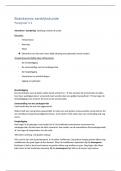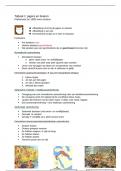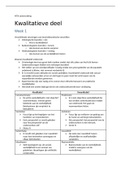Richard jenkyns
Dido and Aeneas – who’s to blame
- Told that dido does not care what her people think once she has consummate her love for Aeneas –
calls it marriage and adorns her blame
- Should we blame her, Aeneas, the gods?
- Story of dido and Aeneas as a self-contained tragedy within the larger poem of the Aeneid
- Aristotle in 4th century BC in poetics – considered theoretically what the nature of tragedy is
Tragedy is typically about a great person who is mostly good but not perfect and falls through
some hamartia – simple mistake or a moral error
Person cant be wholly good – it wouldn’t be tragic, fall would be repulsive
Person cant be wholly bad – fall would be a matter of satisfaction
Someone who fell because there was a flaw of character/sin that brought them down
- Dido doesn’t seem to have a moral flaw – made supernaturally to fall in love with Aeneas and imposed
on her from outside
- Dido’s moral struggle – whether she should yield to that passion
Is she wrong to do so?
- Dido corresponds to several figures from homer
Calypso, Circe, Nausicaa
Virgil brings out aspects of which dido is like and unlike these Homeric figures
- Story pattern for dido taken from epic of 3rd century BC
Argonautica of Apollonius of Rhodes – if a goddess/queen wants to have an affair with you and
you’re a hero it’s all right
- Tragedy is that it should have been all right -dido has sworn an oath of fidelity to her dead husband
and Aeneas has burden of destiny
- Not right to try and allocate blame – moment in cave invites us to share emotions of people and
sympathise with them
Augustus and the Aeneid
- Presence of Augustus can make readers uncomfortable – is it political propaganda?
- Great leader like Augustus would have wanted a panegyric poem about is glorious deeds
Great dynasts wanted that sort of thing
- Did Virgil have to write a praise poem about Augustus?
No – you didn’t have to write a praise poem about Augustus
o Augustus never got a poem about his glorious deeds
- What Virgil wrote – poem about the distant past where Augustus only appears as a future figure 3
times
Account of his life and achievements are not in the poem
- Importance of patronage – before printing you can’t make money out of being an author
Need to have independent income or you need patronage
- 30’s BC – Maecenas turned himself into the most successful literary patron in western history
Virgil, Horace and Varius
Created a brilliant literary circle
- Did he pressure them to write propaganda? – he cant have been as they didn’t
Wrote very little in first years
Virgil was working on the georgics
- Maecenas was astonishingly patient – prepared to wait for a very long time
What you want is a brilliant circle of poets and the name of Augustus in there
- Word Augustan has become a symbol for consummated civility – Augustan age regarded as one of the
high points of civilisation
Not primarily due to Augustus himself – because of the poets
- Poets gave him immortality in the future
Dido and Aeneas – who’s to blame
- Told that dido does not care what her people think once she has consummate her love for Aeneas –
calls it marriage and adorns her blame
- Should we blame her, Aeneas, the gods?
- Story of dido and Aeneas as a self-contained tragedy within the larger poem of the Aeneid
- Aristotle in 4th century BC in poetics – considered theoretically what the nature of tragedy is
Tragedy is typically about a great person who is mostly good but not perfect and falls through
some hamartia – simple mistake or a moral error
Person cant be wholly good – it wouldn’t be tragic, fall would be repulsive
Person cant be wholly bad – fall would be a matter of satisfaction
Someone who fell because there was a flaw of character/sin that brought them down
- Dido doesn’t seem to have a moral flaw – made supernaturally to fall in love with Aeneas and imposed
on her from outside
- Dido’s moral struggle – whether she should yield to that passion
Is she wrong to do so?
- Dido corresponds to several figures from homer
Calypso, Circe, Nausicaa
Virgil brings out aspects of which dido is like and unlike these Homeric figures
- Story pattern for dido taken from epic of 3rd century BC
Argonautica of Apollonius of Rhodes – if a goddess/queen wants to have an affair with you and
you’re a hero it’s all right
- Tragedy is that it should have been all right -dido has sworn an oath of fidelity to her dead husband
and Aeneas has burden of destiny
- Not right to try and allocate blame – moment in cave invites us to share emotions of people and
sympathise with them
Augustus and the Aeneid
- Presence of Augustus can make readers uncomfortable – is it political propaganda?
- Great leader like Augustus would have wanted a panegyric poem about is glorious deeds
Great dynasts wanted that sort of thing
- Did Virgil have to write a praise poem about Augustus?
No – you didn’t have to write a praise poem about Augustus
o Augustus never got a poem about his glorious deeds
- What Virgil wrote – poem about the distant past where Augustus only appears as a future figure 3
times
Account of his life and achievements are not in the poem
- Importance of patronage – before printing you can’t make money out of being an author
Need to have independent income or you need patronage
- 30’s BC – Maecenas turned himself into the most successful literary patron in western history
Virgil, Horace and Varius
Created a brilliant literary circle
- Did he pressure them to write propaganda? – he cant have been as they didn’t
Wrote very little in first years
Virgil was working on the georgics
- Maecenas was astonishingly patient – prepared to wait for a very long time
What you want is a brilliant circle of poets and the name of Augustus in there
- Word Augustan has become a symbol for consummated civility – Augustan age regarded as one of the
high points of civilisation
Not primarily due to Augustus himself – because of the poets
- Poets gave him immortality in the future










